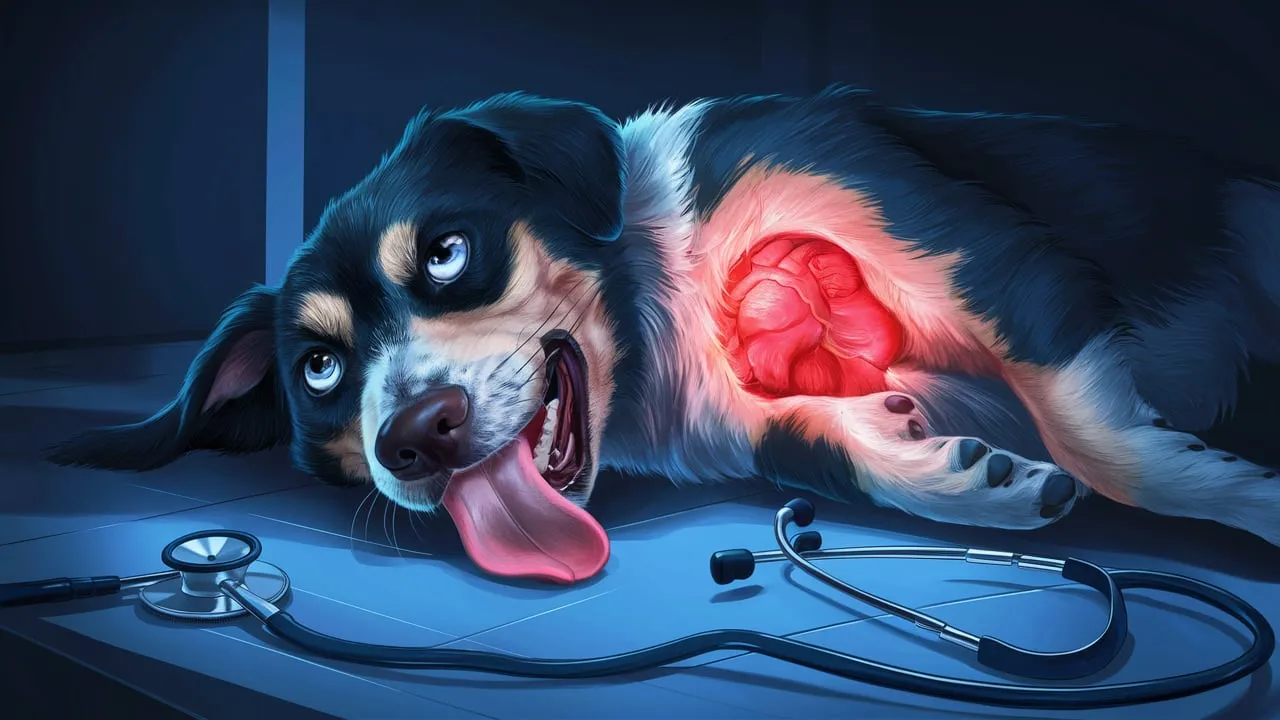A heart attack in dogs is a serious medical emergency that can be life-threatening. Recognizing Dog Symptoms Of Heart Attack early is crucial for getting your furry friend the prompt veterinary care they need.
In this article, The Dogs 247 will delve into the common symptoms of heart attacks in dogs, helping you understand what to look for and how to act quickly to save your beloved companion.
Understanding Canine Heart Attacks
A heart attack occurs when the blood supply to a part of the heart is blocked, typically due to a blood clot. This blockage prevents oxygen from reaching the heart muscle, leading to damage or even death of heart tissue.
Dogs, like humans, can experience heart attacks at any age, but certain breeds are more prone to heart conditions, including:
- Large breed dogs: Great Danes, Doberman Pinschers, Boxers, German Shepherds
- Small breed dogs: Cavalier King Charles Spaniels, Yorkshire Terriers, Shih Tzus
- Brachycephalic breeds: Bulldogs, Pugs, French Bulldogs
Recognizing the Warning Dog Symptoms Of Heart Attack
While not all dogs will exhibit every symptom, here are some common signs of a heart attack in dogs:
- Sudden Collapse: This is often the most dramatic symptom and can be the first indication of a heart attack. Your dog may suddenly lose consciousness and be unable to stand.
- Difficulty Breathing: Dogs experiencing a heart attack may struggle to breathe, exhibiting rapid, shallow breaths or even gasping for air.
- Weakness and Lethargy: Your dog may appear weak, tired, and unwilling to move or participate in their usual activities.
- Coughing: A persistent cough, especially if it is accompanied by other symptoms, can be a sign of heart problems.
- Gagging or Vomiting: Some dogs may experience gagging or vomiting, particularly if the heart attack is severe.
- Pale Gums: Pale or white gums can indicate poor blood circulation, which is a sign of a heart attack.
- Increased Heart Rate: While a fast heartbeat can be a symptom of many things, it can also be a sign of a heart attack.
- Irregular Heartbeat: Listen closely to your dog’s chest. An irregular heartbeat, especially if it is accompanied by other symptoms, can be a sign of a heart attack.
- Restlessness: Your dog may seem restless and anxious, pacing or whining.
- Pain: Dogs may experience pain in their chest, which they may express by whimpering, groaning, or licking at their chest.

What to Do If You Suspect a Heart Attack?
- Stay Calm
It’s important to stay calm and assess the situation. Your dog can sense your fear, and it might make them more anxious. Take a deep breath and try to think clearly.
- Call Your Veterinarian Immediately
Don’t hesitate! Call your veterinarian or an emergency animal hospital right away. Time is of the essence when it comes to heart attacks. Explain the situation clearly and follow their instructions.
- Provide Basic Care
While you’re waiting for help, try to keep your dog calm and comfortable. If they’re struggling to breathe, try to elevate their head and chest. This can help them breathe easier.
- Transport Carefully
If you need to transport your dog to the veterinarian, do so carefully. Avoid any sudden movements that could worsen their condition.
- Follow Your Veterinarian’s Instructions
Your veterinarian will give you specific instructions on how to proceed. Listen carefully and follow their advice.
Remember, every dog is different, and what works for one might not work for another. The most important thing is to stay calm, seek professional help immediately, and follow your veterinarian’s instructions. Good luck, and I hope your furry friend gets better soon!
Preventing Heart Attacks in Dogs:
While you can’t always prevent a heart attack, there are steps you can take to reduce the risk:
Regular Veterinary Checkups: Just like humans, dogs benefit from regular checkups, especially as they age. Your vet can listen to their heart, check their blood pressure, and even do some tests to make sure their ticker is in tip-top shape. Early detection is key!
Maintain a Healthy Weight: Being overweight or obese puts extra strain on your dog’s heart. Make sure they’re getting plenty of exercise and eating a balanced diet. A good walk or playtime is a great way to keep them active and trim!
Address Underlying Medical Conditions: If your dog has any health issues like diabetes, high blood pressure, or thyroid problems, it’s important to work with your vet to manage them effectively. These conditions can increase the risk of heart problems.
Provide a Stress-Free Environment: Just like us, dogs can get stressed out! Try to create a calm and comfortable environment for them. A safe space, regular routines, and plenty of love can help reduce stress levels
Conclusion
Recognizing the Dog Symptoms Of Heart Attack is crucial for giving your furry friend the best chance of survival. Remember that prompt veterinary care is essential in these situations. By being aware of the warning signs, understanding the importance of prevention, and acting quickly, you can help save your beloved companion.

Related Post
Can Dogs Get Poison Ivy?
How To Dog Periodontal Disease Stages?
Why Is My Dog’s Tongue Hot?